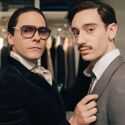 I’ll never forget the first time I saw Forbidden Love: The Unashamed Stories of Lesbian Lives. It was the fall of 1992 and the documentary was premiering at Image+Nation, Montreal’s queer film fest. Four years in the making, Forbidden Love featured interviews with a number of older lesbians from across Canada, each telling their own story about how they lived through a much more conservative era as queer women.
I’ll never forget the first time I saw Forbidden Love: The Unashamed Stories of Lesbian Lives. It was the fall of 1992 and the documentary was premiering at Image+Nation, Montreal’s queer film fest. Four years in the making, Forbidden Love featured interviews with a number of older lesbians from across Canada, each telling their own story about how they lived through a much more conservative era as queer women.
To call the film a revelation would be an understatement, because it’s a film that remains full of revelations. The women are all smart, intriguing, incredibly brave and above all funny. Their sense of humour was clearly part of their survival strategy. They speak of leaving bad marriages to take the risk of finding lavender love. They describe raids on lesbian bars by police. They recall unforgiving parents and co-workers.
Yet somehow, out of all the hardship and resistance, filmmakers Lynne Fernie and Aerlyn Weissman managed to craft a film that was beautifully uplifting. When the final credits rolled, I rose to my feet and cheered with an audience of about 1,000, making for a standing ovation that lasted for close to 15 minutes. It helped that both filmmakers and several of the women who appeared in the film were there to introduce Forbidden Love and conduct a post-screening Q&A session.
Since then I’ve screened Forbidden Love at each and every opportunity I could as a university instructor (it fits neatly into queer, documentary and Canadian cinema classes), as a generation of younger cineastes have no idea it even exists. Sadly, for the past 15 years Forbidden Love has been out of circulation, due to various copyright expirations.
How about we take this to the next level?
Our newsletter is like a refreshing cocktail (or mocktail) of LGBTQ+ entertainment and pop culture, served up with a side of eye-candy.
But happy days are here again: Canada’s National Film Board (NFB), which produced the film, has spent the hard cash it took to renew all the copyrights necessary and Forbidden Love is once again out on a newly-refurbished DVD. This is equally fantastic news for those who have never seen it but also for those of us who have.
 Forbidden Love is not just striking for its content, but its formal originality and ingenuity. Interwoven with the women’s testimonials are a series of fictional vignettes, based on the pulp lesbian fiction of the day. Fernie and Weissman have their two actresses look directly into the camera as each vignette ends, creating a pulp fiction novel cover — but also directly addressing the audience and breaking the fourth wall. They also revise so much of the lesbian pulp fiction of the day, allowing their heroines a happy ending. How’s that for radical filmmaking?
Forbidden Love is not just striking for its content, but its formal originality and ingenuity. Interwoven with the women’s testimonials are a series of fictional vignettes, based on the pulp lesbian fiction of the day. Fernie and Weissman have their two actresses look directly into the camera as each vignette ends, creating a pulp fiction novel cover — but also directly addressing the audience and breaking the fourth wall. They also revise so much of the lesbian pulp fiction of the day, allowing their heroines a happy ending. How’s that for radical filmmaking?
Weissman says a big part of their strategy was to avoid the posture of victim. “When you’re making a film, you’ve got to think about where the focus is,” she says, from her Vancouver home. “The victimization? The resistance? I personally always took issue with the idea that I was marginal. I wasn’t marginal, I was in the middle of things. For many people in the queer community and many of the women in Forbidden Love for example, their resistance is characterized by a remarkable sense of humor and irony, that sense of the disjunction between the way things our institutions say life should be and the reality on the ground, which they know in their own lives is so different than the hetero norm.”
 And Weissman recalls that when doing the interviews for the film, that came up frequently: the constant was a sense of humor. “I think that’s something that John Waters understands very clearly with his work — that resistance is not mean-spirited, it is not stupid, it is smart and it is funny. Laughter in some sense is the revenge.”
And Weissman recalls that when doing the interviews for the film, that came up frequently: the constant was a sense of humor. “I think that’s something that John Waters understands very clearly with his work — that resistance is not mean-spirited, it is not stupid, it is smart and it is funny. Laughter in some sense is the revenge.”
As exhilarating as Forbidden Love is for queer audiences, it has had huge mainstream success, winning the Genie (the Canadian Oscar) for Best Documentary. “As much as the film might be empowering for a community group,” says Fernie, “it also inserts a missing component of Canadian history, and it shows in the fact that it had crossover success, playing at the Toronto International Film Festival (TIFF) and other mainstream festivals, and being broadcast on CBC, PBS and other mainstream broadcasters.”
 Both Fernie and Weissman concede having the film in a legal — and accompanying distribution — limbo was agonizing. They are extremely thankful and relieved that the NFB managed to set aside the considerable funds to allow for the re-release. “It was a funny feeling,” says Fernie, “because we worked so hard to allow those women to tell their stories of liberation on the big screen. And then, for quite some time, it felt like they had been silenced again. Now most of the women in the film have passed away, of course. But it kind of felt like we were liberating them all over again.”
Both Fernie and Weissman concede having the film in a legal — and accompanying distribution — limbo was agonizing. They are extremely thankful and relieved that the NFB managed to set aside the considerable funds to allow for the re-release. “It was a funny feeling,” says Fernie, “because we worked so hard to allow those women to tell their stories of liberation on the big screen. And then, for quite some time, it felt like they had been silenced again. Now most of the women in the film have passed away, of course. But it kind of felt like we were liberating them all over again.”
When I think back to that Montreal screening in 1992, I can’t help but think of what I was experiencing as a gay man. It was the very worst of times for gay men, when AIDS was rightly being compared to a Holocaust by Larry Kramer, and no life-saving drug cocktails in sight. The other landmark film premiering at that year’s festival was The Living End, Gregg Araki’s brilliant meditation on living with HIV in the USA, a feature understandably soaked in grief and anger.
Watching Forbidden Love allowed me to experience a film rooted in reality while escaping my own harsh reality for 84 minutes. And when the final credits rolled, I remember shedding tears as I stood with that diverse crowd, screaming and cheering for this uplifting, invigorating, remarkable bit of filmmaking. I remember thinking to myself, ‘This is what liberation is all about. If only it could always be this fantastic.”
Watch a clip from the film below.
Matthew Hays teaches film studies at Concordia University and is the author of The View from Here: Conversations with Gay and Lesbian Filmmakers (Arsenal Pulp), and the co-editor (with Tom Waugh) of the Queer Film Classics series. His articles have appeared in The Guardian, The New York Times, Vice and The Advocate.


















Cam
Ok, not that I am ANY crusader for lesbians because they can take care of themselves. HOWEVER…..
There are probably 10 transgender articles on here for every one about lesbians in the last year, even though lesbians obviously make up a much larger percentage of the community, and now, on an article about a strictly lesbian film the headline labels it “Queer” when the subtitle of the movie is “The Unashamed Stories of Lesbian Lives”.
You all may need to get at least one women editor here.
middleagespread
I find that the poster looks like Madonna and Angelina Jolie. Looks interesting as to show how far we have come in 40+ yrs.
michael
@Cam: Ha! Good observation. However, I suspect that lesbians don’t often come to Queerty to read articles of interest to them. There are better sites for women (which usually don’t hold a lot of interest for gay men.) Most transgender articles here focus on M to F transition, which most gay men (more or less) understand via exposure to drag culture. Queer(ty) and Gay (agenda) are primarily identifiers for gay men.
Cam
@michael:
I remember there used to be lesbians on the site, always kind of a fun back and forth in the conversation. But you may be right.
Toby Ross
I can’t wait!
davegun2
@Toby Ross: I know me too. I want to see this.
Cobalt Blue
Oh,no. I’m aware I should be more understandable but I just can’t help it. Actually I find the whole lesbian thing so disgusting that even the ” lesbian chic ” seens groos to me. It’s a feeling that I can’t get ride. Strangely I’m more sympathetic with butch dykes ‘ a la ‘ K. D. Lang that has a certain ‘ good behavior ‘ and know how to present themselves into society in opposition to the messed/perv ones that I find totally gross and loughable: truck drivers, ‘ dykes on bykes’ or femminine lesbians. Really joke material. I can see the connections between lesbian and gay agendas, but sorry, I barely can stand lesbians.
1EqualityUSA
I’m a lesbian. I tend to read the political articles and leave you boys to do your thing with the other features on Queerty. SCOTUS interests me more than crushes on swimmers or young actors. The humor in some of the comments here is amazing. The points of view are engrossing too, unless they come from small-minded haters etc. Cam, Lvg1tor, the writer from Texas, and many others have intrigued my brain and validated many of the things that have occurred to me in this struggle for equality. I value your thoughts. My spouse and I have been together almost two decades. As Cobalt Blue would have it, we both have short hair and “present ourselves….good behavior…blah, blah” but it’s not necessary that every other person conduct their lives as we do. If we were all clones, what a boring world it would be. Write on.
Cam
@1EqualityUSA:
2 decades? Congratulations!
1EqualityUSA
Ahh, thanks, Cam. I got so lucky. My spouse is brilliant, fair-minded, fun, and funny. Grace and strength, polished, yet down to Earth, a leader, but nuanced in her manner. I’m never disappointed in her. She (quietly) enhances my life and the lives of those around us. True-blue. The real deal. I’m so tired tonight, I’m typing with one eye closed. Good night, Queertiers.